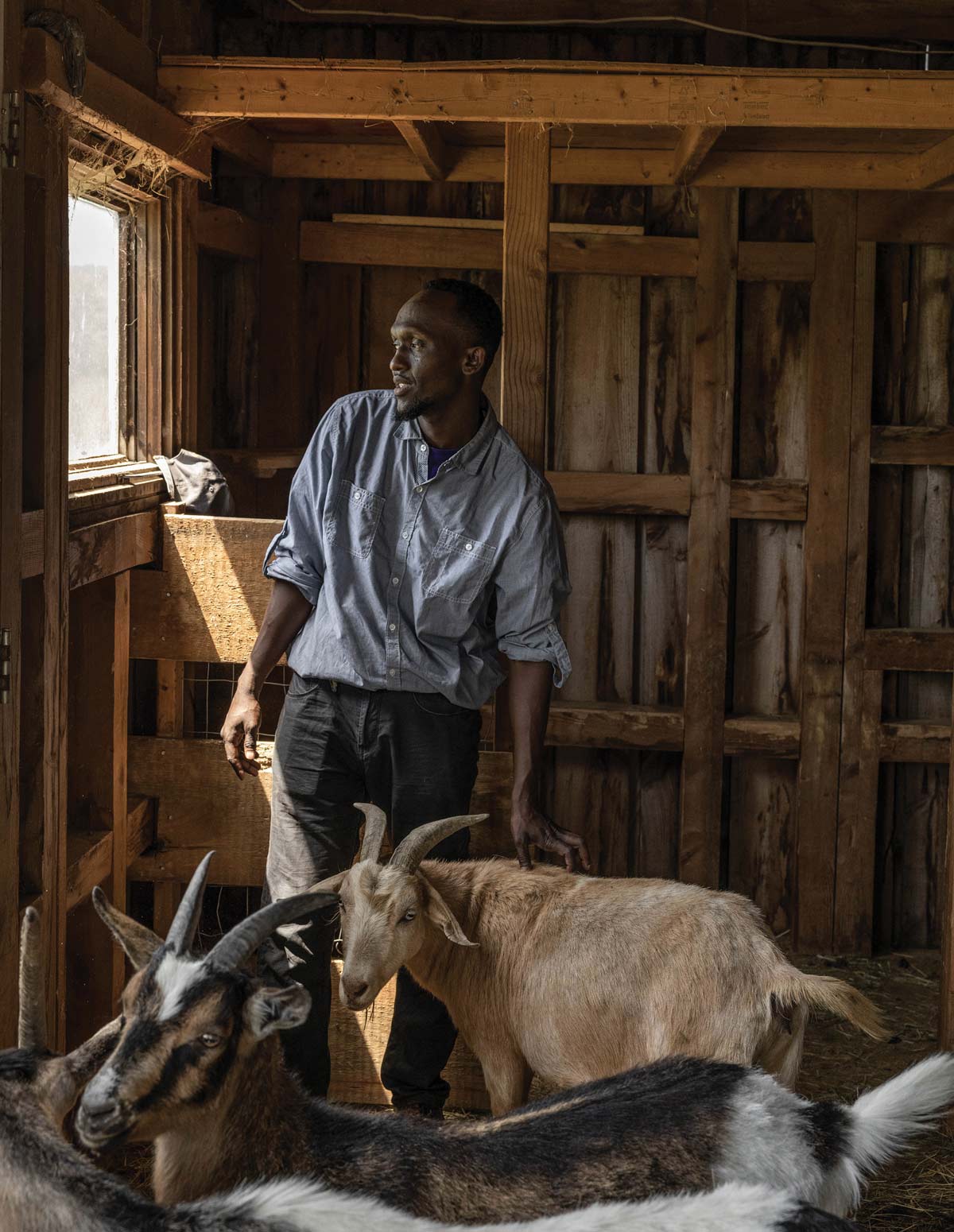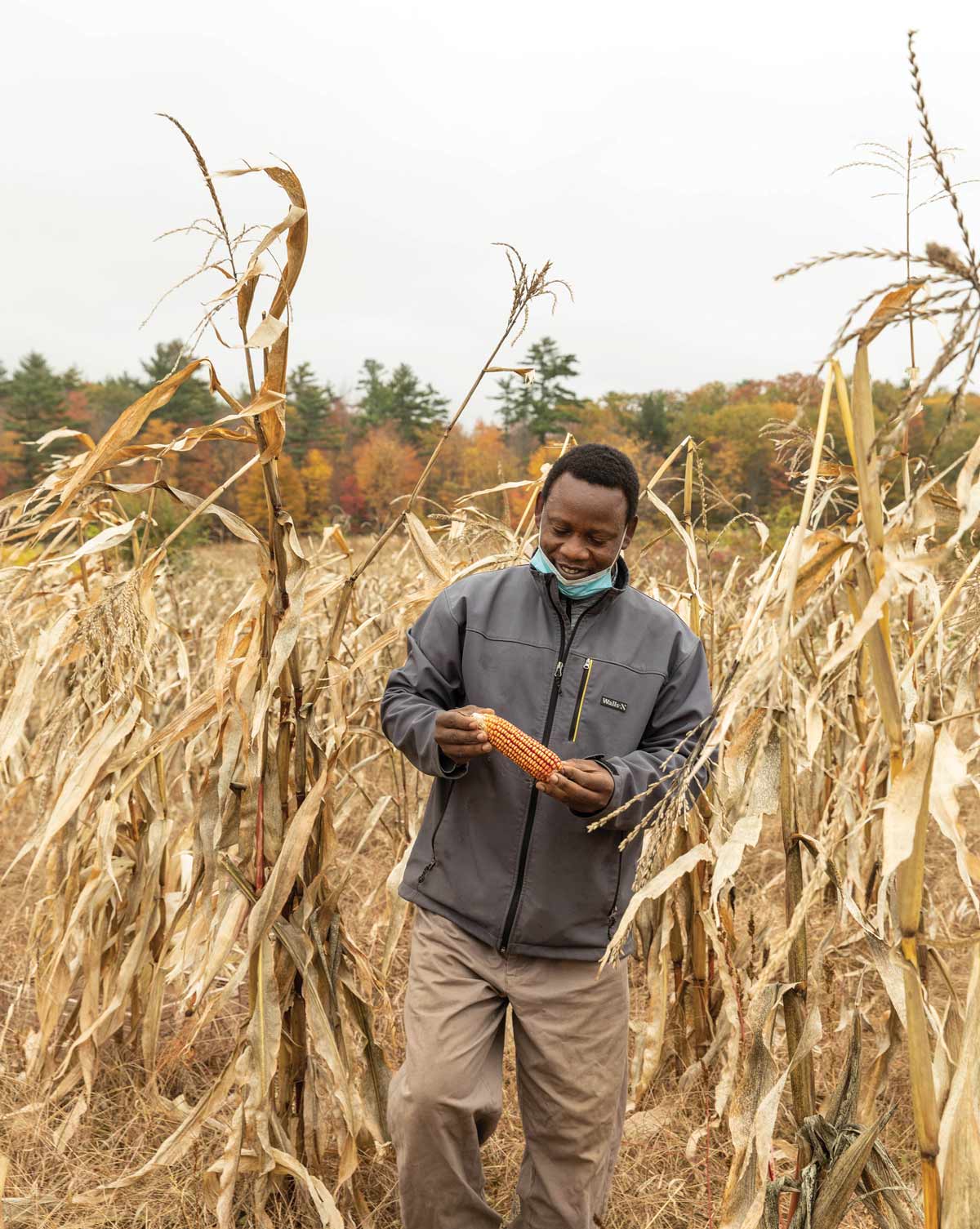By Katy Kelleher
Photos by Greta Rybus
From our August 2021 issue
On a recent Saturday at the Little Jubba Central Maine Agrarian Commons, Ali Hamsa and Muhidin Libah took a break from building a fence around a goat pasture to share a laugh at the orneriest kid in their herd. “She’s aloof,” Libah explained, in English. “She doesn’t get along with the others.” Hamsa made a joke about the scruffy goat in Maay Maay, the language of the Somali Bantu people, and Libah laughed. As they went on working, chatting in their native tongue, their banter had an easy, relaxed rhythm that even a nonspeaker could appreciate.
Farmland was abundant where the two men once lived, in Somalia’s fertile Jubba River valley, where genocidal violence displaced thousands of Somali Bantus in the early ’90s. If you wanted to farm there, Libah says, you simply filled out a form at a permit office and selected some land. “It’s not like America,” he says of his homeland. “Maine is more rural than most places, but it is so much more rural than Maine.”




Somali Bantu families began moving to Maine, mostly in and around Lewiston, in the mid-’00s, after the U.S. agreed to a resettlement program. Ethnic minorities in Somalia, the Bantus came a few years after the first wave of ethnic Somalis arrived in Lewiston. Many set out to continue farming on plots leased from private landowners, but long-term tenancy proved elusive. Libah arrived in Maine in 2005 after more than a decade in a Kenyan refugee camp and almost immediately founded the nonprofit Somali Bantu Community Association. In the 16 years since, he’s farmed on five different properties.

Then, last year, after a crowdfunding campaign raised $367,000, some 200 Somali Bantu Mainers took possession of 104 acres in Wales, just northeast of Lewiston. The deed is held by the Agrarian Trust, a national nonprofit dedicated to deconcentrating land ownership and providing long-term access to land for the next generation of farmers. For the next 99 years, the farm christened Little Jubba will operate as a collective run by a small board of farmers. Its members will grow food for their families and to sell at market. This year, they’ve put in cover crops. They’ve brought in goats and begun parceling out lots. Plans are in place for a community hall, a commercial kitchen, and more.

For Hamsa, laying pasture fence on the weekend is laying a foundation for a new life. In Somalia, he was a farmer. He had 10 acres and made his living selling produce at market. He moved to Maine in 2016 and now washes dishes at Freeport’s Harraseeket Inn. He wants someday to run his own farm business again, to support his family working where his talents apply, and Little Jubba offers that promise. “We appreciate this land,” he says. “Here, we are the landlord, the consumer, everything.”
The farmers plan to make Little Jubba a multigenerational community space. While the majority of the land will be planted with corn, peas, squash, greens, and other crops, some farmers requested that there also be equipment for kids to play on while parents work in the gardens. The farmers are also setting aside space for cultural events, like drumming and dancing, gatherings that can be difficult for a community that largely lives in Lewiston-area apartment housing. (“We will not do anything without alerting our neighbors,” Libah is quick to add. “We will call them and tell them — and invite them.”)
The Little Jubba farmers are also committed to maintaining some of their acreage as lawn. In Somalia, it’s normal to take a midday rest, lying down on the grass someplace shady. This is less accepted, however, in a city park in downtown Lewiston. Many Somali Bantus appreciate having a place they can simply relax without getting roused by police officers or questioned by white passersby, Libah says. “We don’t always feel safe,” he adds.



From left to right: Gamana Yarow, Ahmed Baraki, Hawa Rage.
Ashley Bahlkow is a program adviser for the Somali Bantu Community Association, which formed the Little Jubba Central Maine Agrarian Commons together with the Agrarian Trust. “Think about the refugee resettlement process and what that means for an agrarian culture,” she says. “It’s resettling folks with few resources and in urban settings, because that’s where some of the few resources we do offer exist, like public transportation.” You can’t overstate the significance, she says, of “the simplest thing: lying on the grass.”
“That’s a big part of what this community wants,” Bahlkow says. “The Wales property feels like a realization of that in a really deep way.”
Collectively owned farmland has a rocky history in America, Agrarian Trust director Ian McSweeney says. In Europe, especially in France, farms owned in common have thrived for decades. The closest thing in the U.S., meanwhile, is a robust network of land trusts focused on purchasing land and easements for conservation and recreation, as well as organizations working to supply community-owned housing. “Much of our model,” McSweeney says, “is based on community land trusts and adapting that structure for agriculture.”

What’s more, American farm ownership and tenure have been shaped by generations of racial discrimination. Nearly 70 percent of American farm laborers are non-white, according to Census figures, while some 96 percent of American farm owners are white. Discriminatory policies helped doom the country’s first community land trust, a Black farming cooperative called New Communities, founded in Georgia in the 1960s. When substantial drought affected the area in the 1980s, the USDA provided loans and assistance to white farmers while denying it to New Communities, then eventually seized the community’s deed. In 1999, when the agency settled a class-action suit brought by Black farmers, alleging systematic discrimination in the ’80s and ’90s, the former members of New Communities received the largest payout.
Dismantling racial inequity in land ownership is a pillar of the Agrarian Trust’s mission, and Little Jubba follows a model for which New Communities laid the groundwork. After purchasing it with donated funds, the Agrarian Trust confers the land to a locally managed landholding entity — in this case, the Little Jubba Central Maine Agrarian Commons. The commons board then leases the land to farmers or groups of farmers, at rates the market doesn’t influence, for renewable 99-year terms. While the Agrarian Trust offers institutional support (including legal and financial services), the commons board retains decision-making power for the land’s use, and bylaws prohibit the land from ever being sold.
Little Jubba is one of 10 new Agrarian Commons projects the Agrarian Trust is seeding nationwide, from West Virginia to Washington. It’s an ambitious effort that will “only be successful if each farm is unique to its place,” McSweeney says. “It needs to be on a human scale.”
Lana Cannon Dracup is the Somali Bantu Community Association’s farm operations manager. In recent years, she’s worked with the community on rented plots at Auburn’s Whiting Farm, where work has continued this summer while the Little Jubba farmers prep the land in Wales. Dracup’s role is ostensibly to teach the Bantu farmers, but she’s found that often “these prescribed roles get reversed.” For instance, she says, she’d have never thought to grow okra in Maine’s climate.



At right: Hawa Hassain.
“But the conditions at Whiting worked,” Dracup says, “and we got such a good crop last summer.” She’s watched farmers sow flint corn seeds, brought from Africa, then wait patiently to see what comes up. Like okra (and Egyptian spinach and pigweed), the corn was a hit. “This year, we’re going to try some white melons they’ve been telling me about,” she says. “We want people to grow what they’re familiar with.”
And yet, the goal isn’t to recreate the Jubba Valley in the hills of Wales. The Bantu farmers are learning new skills, eating new foods, and speaking new languages. Dracup watches as they put in their gardens, each taking different approaches, many experimenting. “I’ve noticed that some farmers have the most beautiful way of growing corn, with five feet between each cluster,” she says. “Then, they interplant things underneath: tomatoes, squash, hardy greens, melons, onions.” The practice helps ensure that crops on the bottom get plenty of sun in the spring and shade come summer. “It creates a microclimate,” Dracup says. “It retains water, and it keeps all the plants healthy.”




At top left: Ali Bule.
In a sense, that’s what Little Jubba is doing: creating a microclimate, a space where people can grow, learn, thrive, and integrate into the U.S. without losing themselves. The farmers’ children are growing up as Americans — “all the kids speak English,” Libah says, “but only a tiny portion of the adults in our community do” — but it’s important to their parents that they learn about Somali Bantu culture as well. At Little Jubba, kids can watch their parents farm. They can eat produce not commonly offered in American supermarkets and hear music performed by their neighbors. Meanwhile, Hamsa hopes, non-Somali Mainers will come to the farm stand and join the CSA program, engaging with the Little Jubba farmers. “We will increase our cultural existence in America,” he says. “We can grow African cultural foods and sell them. I want people to know that we’re participating in the economy.”
As Hamsa and Libah neared completion on their goat fence, Libah offered one more observation. “We are very hard workers,” he said, admiring their progress. “Given the opportunity, we will be successful community partners. We will be proud Mainers.”




